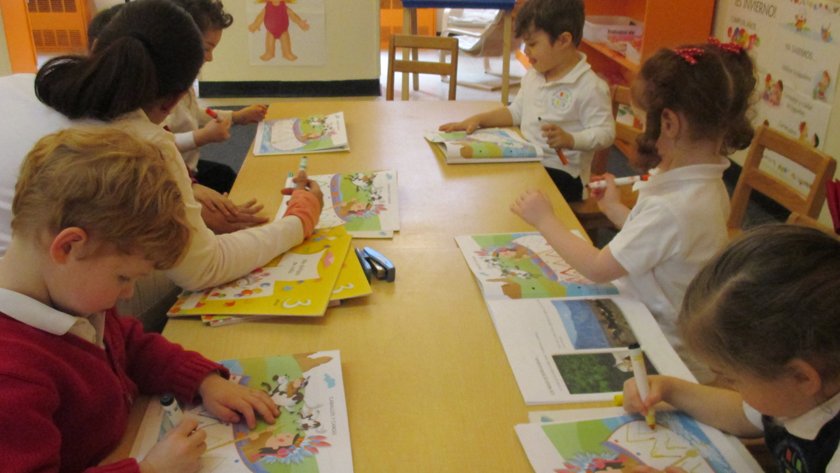Many mothers and fathers find it hard to leave their children in preschool. Uncertainty about whether it will be a good decision leads them to ask many questions: “Isn’t he still too little? How will being separated from his family so long affect him? Will it be positive for him? Am I doing the right thing?”
The answer to all these questions is: if the center has good personnel and a qualityprogram, there’s no cause for concern. Going to preschool has many advantages for your child’s development. Below we list just some of them.
1-Preschool fosters a child’s social and emotional development
In many cases, a preschool center is where a child interacts with other children for the first time. Preschool therefore brings something new to children’s lives: they will experience being with their peers, start to have feelings of belonging to a group, and learn there are rules and timetables that everyone should keep.
He or she will learn the groundwork for living in society: sharing, having fun with friends, playing, standing up for himself, and solving problems individually and together.
Preschool also foster emotional development. Preschool teachers help children learn to recognize and control their feelings of frustration and anger. The teachers don’t just solve the children’s problems, they also encourage them to try to find a solution to their problems on their own.
2-Preschool aids in the child’s acquisition of mental and motor activity skills
A preschool center with aquality program includes many games and activities designed to enhance motor skills, develop hand-eye coordination, improve balance, etc.
Most of the time, children want to be moving around, so improving their physical coordination allows them to have more autonomy for exploring and enjoying their environment. We will go into this point further in another article because of its importance to a child’s education.
3-Preschool boosts language and communication development
Children use a different language to communicate among themselves to the one they use with adults, drawing on different registers and gestures.
At preschool, children understand that the way to communicate with grown-ups also changes, depending on circumstances and the place where they are. Adult family members are likely to be more receptive to their gestures of affection and their demands than the preschool staff are, meaning they will learn that if they want something, they must communicate it in another, more explicit, fashion.
Preschool activities also help introduce the child to new vocabulary. The teachers ask questions, sing songs, and tell stories about daily topics in the children’s environments and about other matters concerning science, nature, or art.
4-Preschool is good preparation for school
Children in preschool become familiar with numbers and the letters in the alphabet, consolidating the basic language and math skills which will help them when they go on to learn more about them in school.
Preschool teachers and support staff know how to combine this pre-math and pre-language learning with games and fun activities that foster curiosity in the child and their thirst for knowledge, at the same time as they play and have fun.
5-Children at preschool learn to look after other people and themselves
At preschool, children become accustomed to taking responsibility for minor tasks such as hanging up their coats when they arrive, clearing toys away after an activity, washing their hands before eating, etc.
Through different activities, the children start to become aware of themselves and their bodies and to take certain responsibility regarding personal care.
The teachers also encourage the children to help each other, especially when there is a child who is finding it hard to perform a task, and to work in a team to achieve certain goals.
6-Play is fundamental to good psychological development
One of the things your child will like most about preschool is that it’s great fun. Toys all over the place, dances, songs, games, and activities – preschool is the perfect place for children to play quietly or to interact with others.
At this age, play is not just fun but is fundamental to a child’s psychological development. Shared games and activities facilitate subsequent learning such as language comprehension, the feeling of ownership, dialogue, respect, and more.
7-Preschool enriches the growth process
Preschool is an opportunity to increase the number of stimuli to learn from.
If the preschool center has a quality program, parents can be relaxed because their children will be well cared for, create emotional bonds with other people, make friends, and enjoy activities at the same time as their personal qualities are developed, they acquire new knowledge, and they shore up their self-confidence.
All of this is supervised by qualified personnel who know all about children’s progression and are attentive to any problem that may arise.


